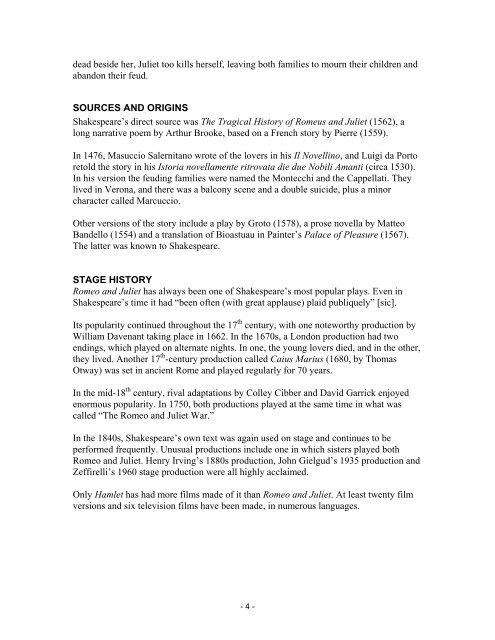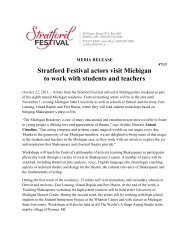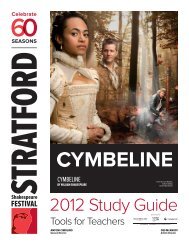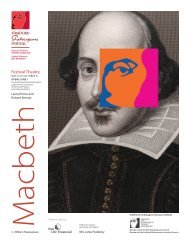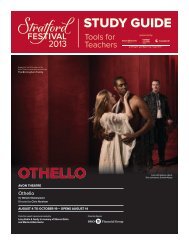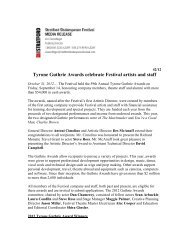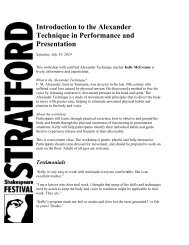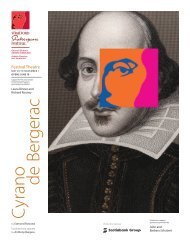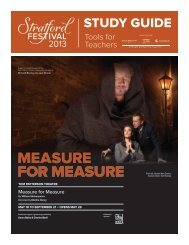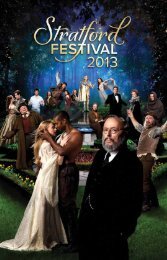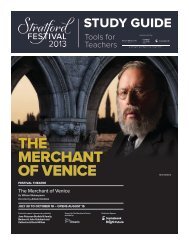ROMEO AND JULIET - Stratford Festival
ROMEO AND JULIET - Stratford Festival
ROMEO AND JULIET - Stratford Festival
Create successful ePaper yourself
Turn your PDF publications into a flip-book with our unique Google optimized e-Paper software.
dead beside her, Juliet too kills herself, leaving both families to mourn their children and<br />
abandon their feud.<br />
SOURCES <strong>AND</strong> ORIGINS<br />
Shakespeare’s direct source was The Tragical History of Romeus and Juliet (1562), a<br />
long narrative poem by Arthur Brooke, based on a French story by Pierre (1559).<br />
In 1476, Masuccio Salernitano wrote of the lovers in his Il Novellino, and Luigi da Porto<br />
retold the story in his Istoria novellamente ritrovata die due Nobili Amanti (circa 1530).<br />
In his version the feuding families were named the Montecchi and the Cappellati. They<br />
lived in Verona, and there was a balcony scene and a double suicide, plus a minor<br />
character called Marcuccio.<br />
Other versions of the story include a play by Groto (1578), a prose novella by Matteo<br />
Bandello (1554) and a translation of Bioastuau in Painter’s Palace of Pleasure (1567).<br />
The latter was known to Shakespeare.<br />
STAGE HISTORY<br />
Romeo and Juliet has always been one of Shakespeare’s most popular plays. Even in<br />
Shakespeare’s time it had “been often (with great applause) plaid publiquely” [sic].<br />
Its popularity continued throughout the 17 th century, with one noteworthy production by<br />
William Davenant taking place in 1662. In the 1670s, a London production had two<br />
endings, which played on alternate nights. In one, the young lovers died, and in the other,<br />
they lived. Another 17 th -century production called Caius Marius (1680, by Thomas<br />
Otway) was set in ancient Rome and played regularly for 70 years.<br />
In the mid-18 th century, rival adaptations by Colley Cibber and David Garrick enjoyed<br />
enormous popularity. In 1750, both productions played at the same time in what was<br />
called “The Romeo and Juliet War.”<br />
In the 1840s, Shakespeare’s own text was again used on stage and continues to be<br />
performed frequently. Unusual productions include one in which sisters played both<br />
Romeo and Juliet. Henry Irving’s 1880s production, John Gielgud’s 1935 production and<br />
Zeffirelli’s 1960 stage production were all highly acclaimed.<br />
Only Hamlet has had more films made of it than Romeo and Juliet. At least twenty film<br />
versions and six television films have been made, in numerous languages.<br />
- 4 -


